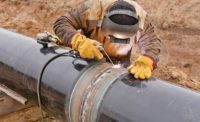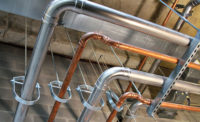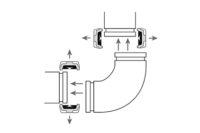Editor’s Note: This is the second in a multi-part series about the Online Piping and Usage Specification (OPUS) resource available from the Mechanical Contractors Association of America (MCAA).
In the December issue of pme, the Online Piping and Usage Specification (OPUS) website, www.opuspiping.org, was introduced as a resource for basic information regarding common piping systems, materials and joining methods. The purpose of that article was to introduce readers to the breadth and depth of the piping industry, with its vast array of options supported by an even greater range of information. OPUS serves, in Swiss-Army-knife fashion, as an indispensable portal to that voluminous information.
So, who would use OPUS and how would they learn about it? This article focuses on students and faculty in college classrooms who use OPUS as a resource for teaching and learning.
One way both faculty and students learn about OPUS is through a network of student chapters sponsored by MCAA. University faculty also learn about OPUS during an annual “boot camp.”
The student chapter program of the MCAA began in 1993 at Purdue University as a means to introduce college students to the piping industry and recruit young talent for the mechanical contracting industry. The program has grown to 55 U.S. and Canadian chapters and provides an impressive range of benefits to both student chapter members and their faculty.
These chapters, faculty and future employers have opportunities to meet and network through a variety of sponsored meetings at far-ranging venues such as MCAA’s annual GreatFutures Forum and its highly regarded annual convention. Throughout all these venues and events, OPUS is always present and available and presented as a resource for students to use for the rest of their professional lives.
Faculty members receive special attention and special access to OPUS. Each summer, MCAA and the National Electrical Contractors Association (NECA) co-sponsor the Mechanical Electrical Academic Consortium (MEAC) Mechanical and Electrical Faculty Boot Camp. The boot camp provides the opportunity for university-level construction management faculty, who teach mechanical and electrical construction in their respective programs, to be trained in the area of mechanical and electrical construction management.
These professors have extensive construction management experience, but it is typically not in the mechanical/electrical field. However, the American Council for Construction Education (ACCE) requires accredited construction management programs to include courses related to the principles of mechanical, electrical and piping systems. MEAC is designed to bridge the gap for these faculty by providing them with knowledge and indispensable teaching resources, such as OPUS, to help them teach these courses.
Daryl Orth, a former professor at Purdue and later Northern Kentucky University, was an early adopter of using OPUS in the classroom. He developed a “scavenger hunt” assignment for his students. This assignment features random questions about piping systems the students might encounter during their careers.
Orth, who coordinated the MEAC boot camp and taught numerous sessions there, realized the value of this OPUS-based learning opportunity and shared the assignment with the faculty in attendance. Over the years, more than 100 professors from various institutions of higher learning have discovered OPUS and received Orth’s sample assignment as an effective tool for them to use in their classroom.
Associate Professor Shannon Nicklaus (Pittsburg State University in Pittsburg, Kansas) is another college professor who uses OPUS in his teaching:
“In my plumbing class, I have a homework assignment that requires my students to utilize the OPUS website,” Nicklaus says. “I am a firm believer in having the information on the internet for a couple reasons. The first, is that it allows them to gain the basic knowledge of piping materials, processes and manufacturers.
“The second is that they now have knowledge of a location where they can continue their lifelong learning after they graduate. I have students tell me they have gone back and looked at the site when they obtained full-time work to help ‘bump’ their memory on materials and processes, and some to find suppliers for that certain material. I really love the site and hope it continues.”
OPUS is not a panacea; there are many things for which it is not appropriate. It was not intended as a resource for system design, nor was it intended for faculty and students teaching or studying HVAC systems.
It is intended for those who need basic information about piping materials, systems and joining techniques. It is intended for people like professors Orth and Nicklaus and the students they teach. For them, OPUS is a quality resource for teaching and learning about an industry where careers are built. Sometimes, a Swiss army knife is enough.



